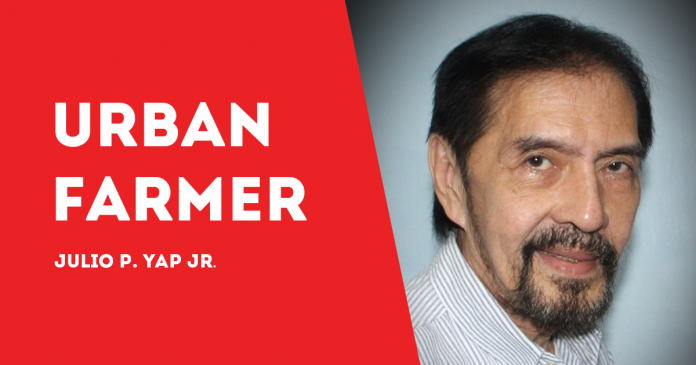
THE country’s food system in the “old normal” has been described as Unjust, Unhealthy, and Unstable.
Dr. Eufemio T. Rasco, Jr. said this in his presentation dubbed “Food security challenges and opportunities under the new normal: Perspectives from Science and Technology” during a recent webinar organized by the Philippine Council for Agriculture, Aquatic and Natural Resources of the Department of Science and Technology (DOST-PCAARRD).
The webinar was a celebration of the 9th anniversary of the merging of councils of Agriculture, Forestry and Natural Resources, and the Aquatic and Marine.
According to Rasco, an academician of the National Academy of Science and Technology, a collegial advisory body under the DOST, it is “unjust” because both consumers and farmers have lost control of the food system, where the input suppliers dictate the price of inputs, while traders dictate the price of outputs.
It is “unhealthy” because the food system is dominated by a few food commodities, like sugar, white rice, white flour, chicken, and pork, saying that these food commodities are not the best for the nutrition and health of consumers.
He added that in the Philippines and in the rest of the world, “the main cause of human morbidity and mortality is not COVID-19.”
Stressing that chronic diseases like heart failure, stroke, diabetes, and cancer, are linked to excessive consumption of highly refined carbohydrates.
It is “unsustainable” because the pollution caused by the industrial food systems contaminated the country’s soil and waters.
He also raised the issue of migration of rural folks to the cities and opined that cities are too congested by people who left farming.
Nonetheless, he proposed “three Ds” in the new normal to address the weaknesses of the food system in the old normal. These “Ds” stand for diverse diet, diverse farm, and digital technology.
On diversification of diet, he said that in 2019, an international scientific panel recommended a food selection guide called “planetary health diet.”
Rasco also said the S&T community can help promote the planetary health diet by integrating knowledge of the food system in all levels of education.
There should be greater emphasis on R&D for diversification of food production in the seas, lakes, and rivers.
“Historically and geographically, the Philippines is a maritime country not an agricultural country,” he said.
On digital technology, Rasco said it will enable direct connection between farmers and consumers, thereby reducing retail price while increasing farmers’ income.
Rasco also highlighted the role of the consumer in the new normal and considers them as “the key to the solution of the problems of the existing food system.”
Correspondingly, “the new normal is characterized by greater interest in producing food at the household and community levels and an awareness of the value of diversity in food creates opportunities for fixing the whole food system,” he said.
He, however, reiterated the role of the consumer and emphasized that the first step must come from them, underlining government intervention to encourage people in the rural communities to stay and produce food./PN
Dr. Eufemio T. Rasco, Jr. said this in his presentation dubbed “Food security challenges and opportunities under the new normal: Perspectives from Science and Technology” during a recent webinar organized by the Philippine Council for Agriculture, Aquatic and Natural Resources of the Department of Science and Technology (DOST-PCAARRD).
The webinar was a celebration of the 9th anniversary of the merging of councils of Agriculture, Forestry and Natural Resources, and the Aquatic and Marine.
According to Rasco, an academician of the National Academy of Science and Technology, a collegial advisory body under the DOST, it is “unjust” because both consumers and farmers have lost control of the food system, where the input suppliers dictate the price of inputs, while traders dictate the price of outputs.
It is “unhealthy” because the food system is dominated by a few food commodities, like sugar, white rice, white flour, chicken, and pork, saying that these food commodities are not the best for the nutrition and health of consumers.
He added that in the Philippines and in the rest of the world, “the main cause of human morbidity and mortality is not COVID-19.”
Stressing that chronic diseases like heart failure, stroke, diabetes, and cancer, are linked to excessive consumption of highly refined carbohydrates.
It is “unsustainable” because the pollution caused by the industrial food systems contaminated the country’s soil and waters.
He also raised the issue of migration of rural folks to the cities and opined that cities are too congested by people who left farming.
Nonetheless, he proposed “three Ds” in the new normal to address the weaknesses of the food system in the old normal. These “Ds” stand for diverse diet, diverse farm, and digital technology.
On diversification of diet, he said that in 2019, an international scientific panel recommended a food selection guide called “planetary health diet.”
Rasco also said the S&T community can help promote the planetary health diet by integrating knowledge of the food system in all levels of education.
There should be greater emphasis on R&D for diversification of food production in the seas, lakes, and rivers.
“Historically and geographically, the Philippines is a maritime country not an agricultural country,” he said.
On digital technology, Rasco said it will enable direct connection between farmers and consumers, thereby reducing retail price while increasing farmers’ income.
Rasco also highlighted the role of the consumer in the new normal and considers them as “the key to the solution of the problems of the existing food system.”
Correspondingly, “the new normal is characterized by greater interest in producing food at the household and community levels and an awareness of the value of diversity in food creates opportunities for fixing the whole food system,” he said.
He, however, reiterated the role of the consumer and emphasized that the first step must come from them, underlining government intervention to encourage people in the rural communities to stay and produce food./PN






